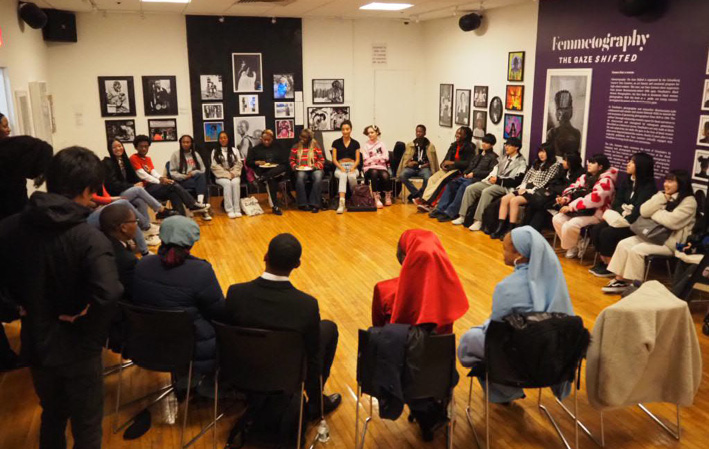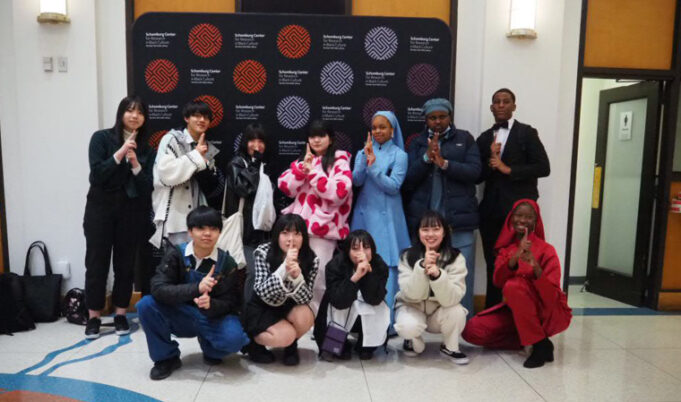by Daleel Jabir Muhammad
NEW YORK—Japanese high school students met with their peers in Harlem to discuss combating racism, learn about rich African history, and dispel myths about what Black life is really like in America. The International Youth Leadership Institute, led by Executive Director Jadayah Muhammad, the United Nations Department of Global Communication, and The Schomburg Center for Research in Black Culture, convened the joint venture.
Students from Fukushima Futaba Future School in Japan, and The Schomburg Junior Scholars along with Muhammad University of Islam-NYC high school students conferenced at the Schomburg Center for the event.
International Youth Leadership Institute (IYLI) is a New York-based 501(c)3 with the mission to nurture a new generation of visionary leaders from the African diaspora who, inspired by their rich African heritage, are committed to leaving a legacy in the world. Students from IYLI attend workshops, seminars, and travel in the USA as well as globally in Africa, the Caribbean, and Latin and South America to develop advocacy and leadership skills to better their communities at home and abroad. They are also formally associated with the United Nations Department of Global Communication (DGC).
Jadayah Muhammad shared how the conference was initiated. “I first met the Fukushima Futaba Future High School in 2017, when they were introduced to my team as guests of the Permanent Mission of Japan to the United Nations. They send students every year to share information about the progress of their school students in the work to revitalize their community in the aftermath of the March 11, 2011, earthquake, and subsequent nuclear meltdown. They shared about the work they’re doing to combat discrimination from others in Japan who stigmatized being from a region where a nuclear disaster has occurred. I shared that as a Black person living in the United States, I can empathize with being discriminated against,” she explained.
In preparation for their trip, from March 10-17, Fukushima Futaba Future High School Principal Ippei Nango said, “It is most important to realize a community that recognizes the diversity and to pass on the lessons of historical events to future generations.”
The students enjoyed the experience:
“At first, when I heard the word Harlem, I had an image that there were many scary people and that it was dangerous. But when I went there and met everyone, I realized that nothing was different from us. I was very happy that everyone was kind and interested in talking to us. Just as we were discriminated against just because we were from Fukushima after the earthquake, we felt embarrassed that we were judging Harlem with only the image we got from the limited information,” said 17-year-old Futaba student Nui Watanabe.

“Meeting the students from Fukushima was an amazing experience! We often hear about tragedies, but if they don’t directly affect us, we sigh, say dang, and move on. I say we because I too, am guilty of doing the previous. … In their presentation, they discussed paying it forward. Paying it forward means repaying someone’s act of kindness by being kind to someone else. The students blessed me with making me more knowledgeable of situations around our Earth, so now I’m paying it forward. … Also, watching them step out of their comfort zone by presenting in English reminded me how much growth can occur when you step out of your comfort zone,” said MUI student Saalihah Muhammad, 15.
“I think the students from Fukushima made a beautiful presentation because they showed how the earthquake affected each of them and also stated the issues they were experiencing because of it; making for a very heartfelt and effective presentation. I also enjoyed the conversation that took place after. We were able to bond and discuss the issues that we shared, making for an extremely constructive conversation, which consisted of our lack of government trust, the education system, and how we can help. I am very thankful for this opportunity because not only did it educate me, but it also gave me a chance to meet so many nice and lovely people,” said 15-year-old MUI student Saarah Muhammad.
“I enjoyed my experience meeting with the students from Futaba Future High School in Fukushima and listening to their presentations. …They also told us about the discrimination they get in Japan because of where they are from. Having experienced discrimination, myself, I could feel personally how degrading it must be for them. Even with this, however, they triumph over it and try to educate others around the world about the tragedy that happened where they once lived,” said 17-year-old Shahid Muhammad.
“When I gave a presentation about Fukushima to Harlem students, everyone listened intently and gave us lots of advice and questions. As a result, we were able to deepen our thoughts and deepen our relationship with them,” Kokone Suzuki, 17, said.
The Japanese guests visited historical landmarks in New York including the famed Apollo Theater in Harlem, the Sugar Hill section near City College, and the Malcolm Shabazz Masjid on 116 Street (formerly Temple No. 7). They were given the rich history of the Nation of Islam and its Eternal Leader, the Most Honorable Elijah Muhammad along with the legacy of Malcolm X and the Honorable Minister Louis Farrakhan’s contributions in Harlem.
At the Schomburg Center, they learned about different approaches to the Black liberation struggle from Martin Luther King Jr., Langston Hughes, Frederick Douglass, and the Nation of Islam. The students also learned the history of Arturo Schomburg, who was a historian, writer, and Puerto Rican of African descent who compiled many archives of the contributions made by African Americans that he bequeathed to the New York Public Library and how the research center came to be.
The Japanese high school students ended their weeklong historical tour with a visit to the United Nations in New York City.
The Final Call













